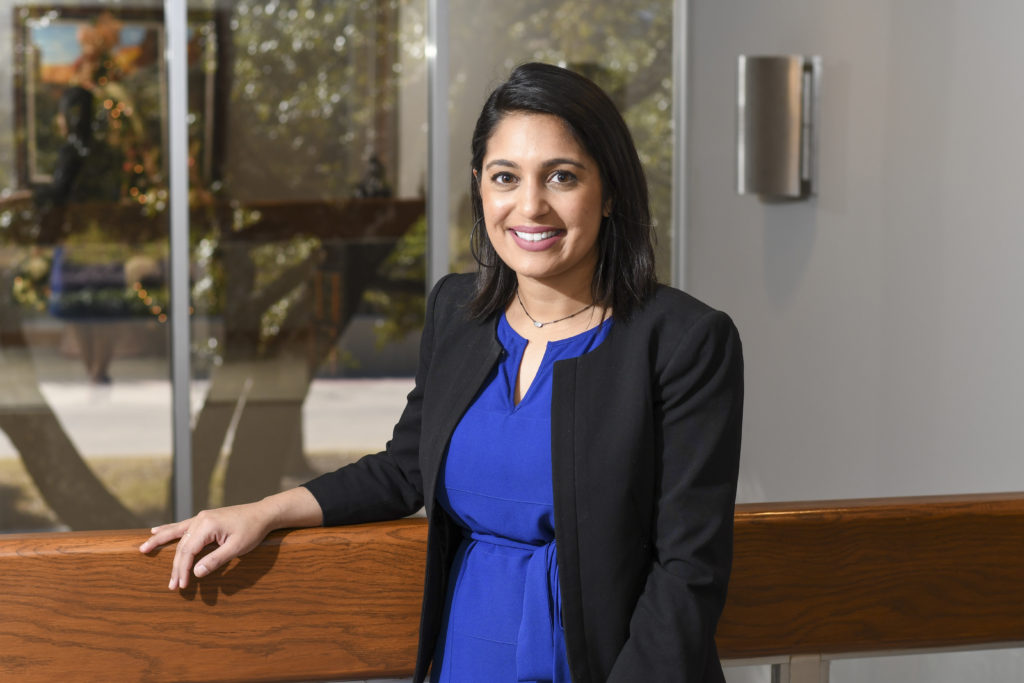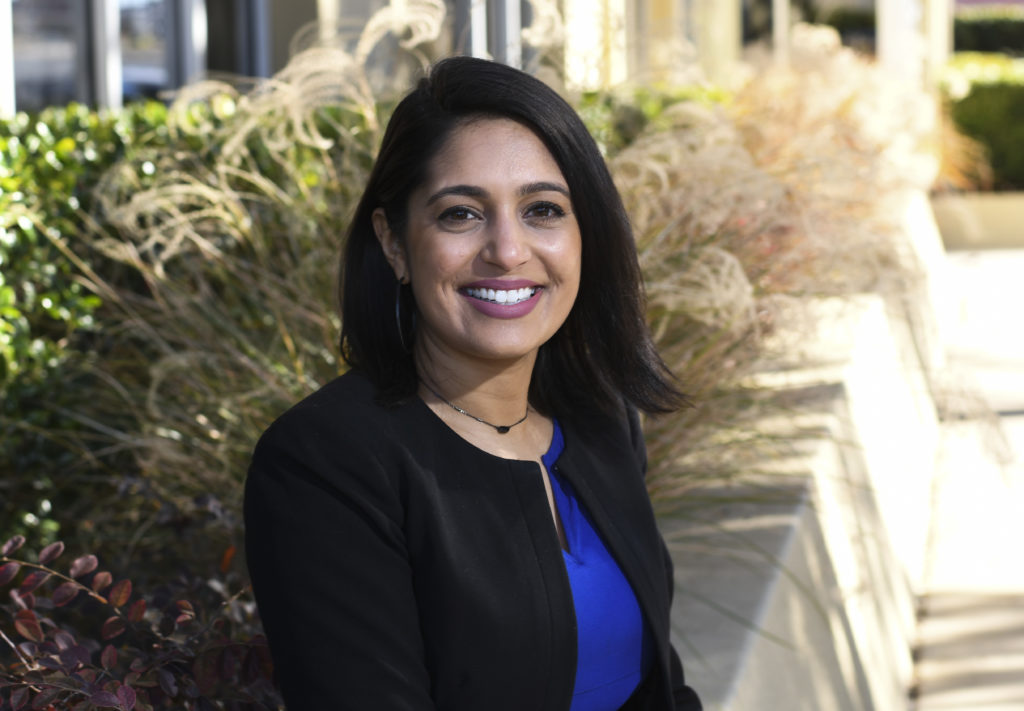
Morgan Lewis associate Maryann Zaki was “feeling the balance between being a mom and a lawyer” that so many young female corporate attorneys face. After a long day at the office, the Houston litigator arrived home to find a package.
“Punam made me feel like a champion with a simple gift,” Zaki says.
Punam is Ben E. Keith Assistant General Counsel Punam Kaji, widely viewed as one of the brightest young stars of the corporate in-house legal community.
The gift: a candle and a succulent. There was a note: “You Grow Girl.”
“Punam explained how proud she was of me,” says Zaki, who is also a rising star in the profession. “Punam is an amazing lawyer and a wonderful person. She is a gem of this profession.”

Kaji, board certified in labor and employment law and just seven years out of law school, is a finalist for the 2019 DFW Senior Counsel of the Year Award for a Small Legal Department, thanks to Zaki’s nomination.
The Association of Corporate Counsel’s DFW Chapter and The Texas Lawbook are honoring the finalists and announcing the winners for the 2019 DFW Outstanding Corporate Counsel Awards Jan. 30 at an event at the George W. Bush Institute.
“What truly sets Punam apart and what I witnessed at the firm was her natural ability to connect with clients and form strong bonds in terms of being a trusted advisor,” says Haynes and Boone partner Matthew Deffebach.
“On many of my matters, Punam was exceptional at truly understanding the client’s expectations and building strong personal relationships,” says Deffebach, who Kaji describes as a mentor. “She equally applied this skill as a natural advocate when dealing with opposing counsel who knew they could trust her and that she was going to treat them with respect while at the same time zealously representing her clients.”
When asked to cite their biggest or most important achievements, most lawyers tell about a courtroom or agency victory – and Kaji certainly has had those. But her answer is much more practical and considerably more impactful for her company and its 4,000 employees.
“My biggest success has been building bridges with the human resources department,” she says. “This relationship has allowed me to not only put out fires but help tackle issues proactively. We have caught issues, created processes, ensured more consistency and better served our local branches, thanks to a simple effort to collaborate and set aside time to address the subject.”
“My sister went to medical school and took some of the pressure off me to become a doctor.”
Kaji says her favorite days at Ben E. Keith, a Fort Worth-based food and beverage distributor with $5.5 billion in annual revenues, are when she visits the company’s huge warehouses to meet with supervisors and employees.
“I take complex legal issues and turn them into relatable hypotheticals that we workshop together,” she says. “Since I like public speaking, this is fun for me. But I also appreciate the time with our front-line supervisors. I learn from them about what stresses they have, and that helps me do my job better.”
Kaji was born and raised in San Antonio. Her parents are immigrants from India. Her mother was a middle school teacher. Her father was a civil engineer. There were no lawyers in the family.
“My sister went to medical school and took some of the pressure off me to become a doctor,” she says. “I thought about becoming a lawyer from a young age. I was not a loud kid, but I had bouts of courage when it came to public speaking or even confrontation.”
Activism was clearly in her DNA. She started following news about the government and economy in middle school. She went to college at the University of Texas in Austin and quickly joined student organizations.
As a student, she lobbied the Texas Legislature on issues ranging from voting rights to international human rights.
During Kaji’s junior year of college, her last living grandparent died. She decided she needed to visit her family’s homeland and meet relatives. She applied and received a grant for a creative writing project. For about six weeks, she explored Gujarat, which is India’s westernmost state.
“I discovered that I had family members who were involved in helping an orphanage and a women’s shelter,” she says. “That really made me feel good.”
Kaji went to the SMU Dedman School of Law.
While taking a full law school course load, she spent five months working at the Human Rights Initiative, a nonprofit that assists asylum-seekers. The cases, she discovered, were dramatic and often heartbreaking.
“I learned how to take on the asylum-seeker’s heavy and personal stories about the horrors they had experienced before fleeing home,” she says. “I wanted to advocate for them, but the actual immigration process was difficult legal work. I didn’t feel like I was that good at it – filling out the forms and navigating the immigration court system had its challenges. It was a moment in law school when I realized I was really unsure of what my legal practice would look like. I had to stay open-minded and curious.”
Kaji has continued to work with HRI throughout her career.
Upon graduating from law school in 2012, she joined the Dallas office of Haynes and Boone. She found a connection with labor and employment work.
“Lawyers know labor and employment attorneys get the best facts – crazy things that happen at work,” she says. “But, more than that, I believe that people are deeply connected to their jobs. They spend most of their time there and need the income to create the rest of their life. I like that the legal work I do touches a significant part of the everyday human experience.”

Kaji worked in the Dallas office of Haynes and Boone for the first 18 months, but she realized that the partner she worked with the most, Matthew Deffebach, was in the Houston office.
“I felt like I could get more experience and hours working for him,” she says. “After a lot of contemplation, advice from friends and planning, I picked up the phone and asked Matt what he thought about me moving to Houston and working in that office.
“I actually still remember making that phone call – it was a big deal to me,” Kaji says. “It was when I realized that I own my career – no one else would make risky choices for me. I had to be intentional enough to know what I wanted and strong enough to ask for it.”
Deffebach said it sounded like a good idea and Kaji moved to Houston.
During her five years at Haynes and Boone, she second-chaired several trials before administrative law judges. She loved cross-examining witnesses especially.
How did Kaji decide to go in-house – and to Ben E. Keith specifically?
“As all fairytales start, a recruiter called me,” she says. “I had been working on some distribution center work for various clients, so I was familiar with the trucks-come-in, trucks-go-out nature of the business. I love food, and Ben E. Keith services restaurants in Texas and surrounding states.
“I have a food blog on Instagram,” she says. “It’s purely for fun. No, I am not trying to exit law.”
Ben E. Keith General Counsel Craig Woodcook had created a new position, assistant GC of employment and litigation.
“By this time in my career, I knew in-house would be a good role for me,” she says. “I liked working for one client at a time. I liked giving common-sense advice. The idea of working with human resources and risk, as we carved out this new role, seemed exciting.”
Kaji says she has to handle a few employment litigation matters annually, but she focuses on being proactive.
“I walk a warehouse whenever I get the chance and always learn something new,” says Kaji, noting that the San Antonio food distribution center is 619,961 square feet. “I made the mistake my first time of wearing heels. Not a good idea.”
“I did a ride-along with a salesperson on our beverage side when I first started,” she says. “We visited customers in the Denton area on an icy day in January. By learning the business you become a better attorney, but you also see what goes into getting a pack of beer into a gas station.”
Kaji says her interaction with Ben E. Keith employees have helped them catch issues and create processes to prevent problems.
Deffebach says Kaji’s “personality and natural ability to foster strong relationships” allow her to excel as an in-house lawyer and as a business leader.
“She thrives when she is helping others and in an organization where she can be a trusted advisor to so many internal clients,” he says.
Diversity in the legal profession is a major issue for Kaji. She has served on the board of several organizations, including chair of the Asian Pacific Interest Section of the Texas bar, which had a direct impact on her career.
Kaji believes that corporate in-house counsel can have a significant influence on diversity, especially regarding the selection of outside counsel.
“Old power structures have to be broken, and new networks have to be woven,” she says. “This has to be done intentionally. For in-house counsel, if the list of go-to outside counsel does not include a woman or ethnic minority, the list is flawed and missing good talent. Corporate legal departments need to ensure diversity with their own internal hiring practices and give diverse in-house counsel the authority to select outside counsel.”
Kaji says corporate law firms need to rethink their diversity and inclusion programs regarding retention and promotion.
“Ultimately though, I left when it was clear that big law meant small life,” she says. “For many of us, it seems the only way to be successful at a law firm is to contribute as many hours of your life as possible. Even more perplexing, how many hours you contribute depends on how much work you are given. The time commitment is huge, and whether and when you make the time commitment is not in your control.”
Kaji says law firms need more than “this one pathway to success.”
“Diverse attorneys want what everyone else does,” she concludes, “an attainable pathway to success.”
